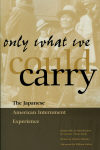
Only What We Could Carry
The Japanese American Internment Experience
Edited by Lawson Fusao Inada2000, 439 pages, Paperback.

 |
Only What We Could Carry
Edited by Lawson Fusao Inada |
ORDER -- Item #2886, Price $18.95
Patricia Wakida is a Yonsei whose parents were interned as children in the Jerome and Gila River camps. She is a graduate of Mills College, where she concentrated on English literature and Asian Studies. Her honors work focused on the Japanese literature that emerged in the wake of the atomic bomb. Her essays, fiction, and poetry have appeared in International Quarterly, The San Francisco Bay Guardian, Kyoto Journal, and Rafu Shimpo. She is currently special projects coordinator at Heyday Books.
William Hohri is a Nisei born in San Francisco in 1927. He was interned at die Manzanar camp during his high school years and graduated from the University of Chicago after the war. Hohri was the chairperson of the National Council for Japanese American Redress (NCJAR) and was the lead named plaintiff in the NCJAR's class action suit, "William Hohri, et al. v. U.S.A." He is the author of Repairing America: An Account of the Movement far Japanese-American Redress (1988) and a columnist for the Rafu Shimpo newspaper.
Book Description from Back Cover
Shortly after the Japanese attacked Pearl Harbor, more than 100,000 Japanese Americans were uprooted from their homes and communities and banished to remote internment camps. This collection of haunting reminiscences, letters, stories, poems, and graphic art gives voice to the range of powerful emotions with which these victims of wartime hysteria struggled. Included are stories of those outside the camps, whose lives were interwoven with those of the internees.
Comments from Back Cover
"Our humanity was carried in those bundles we hastily packed ... the meager possessions we were able to keep and carry with us. I was an infant in 1942, and I wondered how my mother carried me, and other necessities, to Rohwer Camp in Arkansas.
... Blankets/ sheets, a tea kettle...
Coats to keep warm, cotton shirts to keep cool,
Diapers, a deck of cards,
the precious hot plate...
Janice Mirikitani, Poet Laureate of San Francisco, 2000, author of We the Dangerous and Shedding Silence
"Only What We Could Carry gathers together the voices of internment-private, personal stories that could have been lost, but will now be heard and felt. It's as if we have a seat at a family dinner, listening to stories passed down from one generation to another, feeling the pain and the spirit of hope."
David Mas Masumoto, author of Harvest Son: Planting Roots in American Soil
Only What We Could Carry gives us yet another way of looking at an American tragedy....Above all, it is a collection of documents which, together, are a testament to the human spirit."
Roger Daniels, Charles Phelps Taft Professor of History, University of Cincinnati
Background on the Editors
Lawson Fusao Inada is regarded by many as the poet laureate of Japanese America. His collection, Before the War: poems as they happened (1971) was the first volume of poetry by an Asian American to be published by a major publishing house. He is co-editor of Aiiieeeee!(1983) and The Big Aiiieeeee!{1991) and author of Legends from Camp (1992) and Drawing the Line (1997). Inada is a multiple recipient of NEA Poetry Fellowships and has read his works at Ac White House. He has been Professor of English at Southern Oregon State College since 1966.
About |
Contact |
New |
Specials |
Browsing |
Ordering |
Conference |
Links |
Help
Copyright © 2004 by AACP, Inc.
Most recent revision June 27, 2004